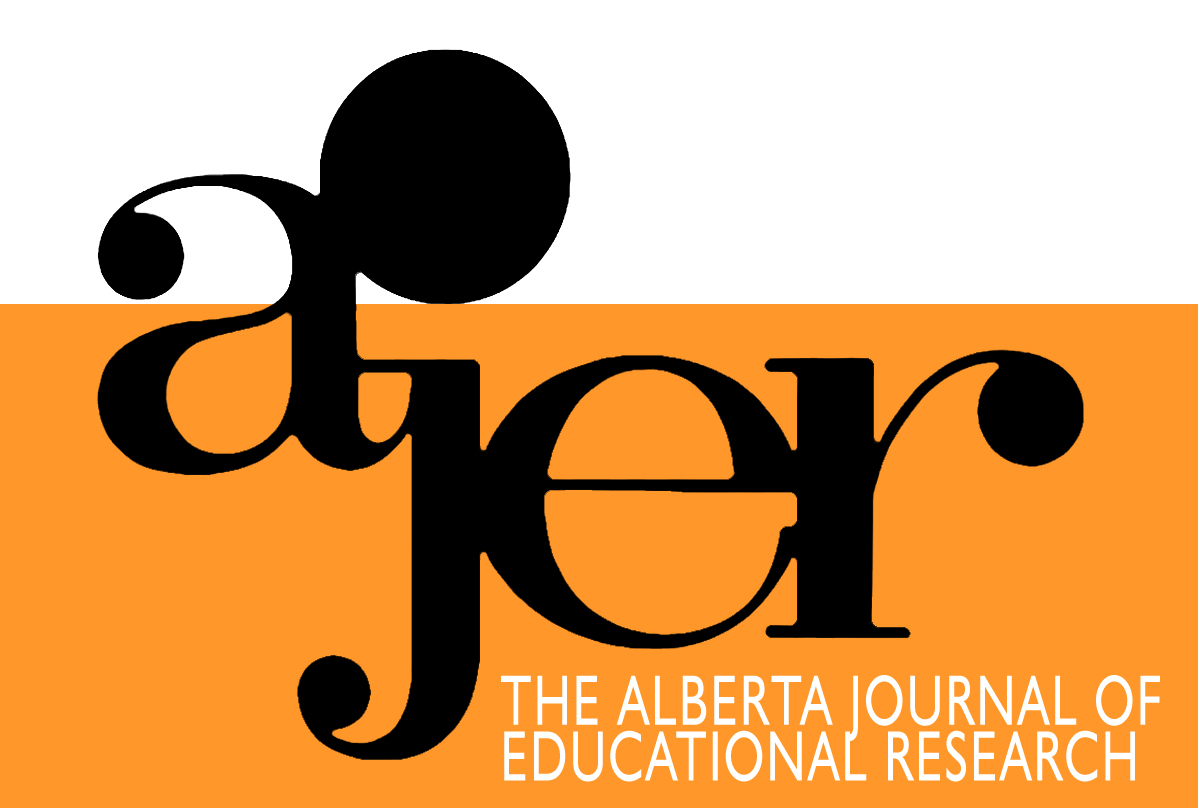Wandering With/In the University of Alberta: Teaching Subjects & Place-based Truth & Reconciliation Education
DOI:
https://doi.org/10.55016/ojs/ajer.v66i1.61704Abstract
This manuscript unfolds in the context of a Faculty of Education course that was designed in response to the Truth and Reconciliation Commission of Canada’s call to post-secondary institutions to identify and meet teacher-training needs relating to the history and legacy of Canada’s Indian residential school system. The course instructor (Madden) begins by tracing how she is theorizing truth and reconciliation education through engagement with literature produced by the Truth and Reconciliation Commission of Canada, and those who respond to their efforts. The pedagogical activity Wandering With/In the University of Alberta animates how she attempted to mobilize these emerging understandings through course design. We then introduce the collective processes we carried out as co-authors (i.e., course instructor and three graduate students who completed the course): creating, analyzing, and representing data, as well as generating the knowledge claims offered throughout. Next, data fragments that weave photographs of and narrative writing about campus sites anchor exploration of three central themes: wandering in relation to (a) evolving understandings of self, (b) a situated and significant historical moment (i.e., Canada 150), and (c) the (imagined) classroom as a site of reconciliation. We conclude with a discussion that explores the relationship between Faculty of Education coursework, identity, and place-based pedagogies for truth and reconciliation education.
Keywords: truth and reconciliation education, higher education, decolonizing, place-based education, teacher identity
Cette étude s’est déroulée dans le contexte d’un cours offert par la Faculty of Education et développé en réponse à l’appel de la Commission de vérité et réconciliation du Canada aux établissements postsecondaires pour qu’ils identifient les besoins en formation des enseignants quant à l’histoire et les séquelles du système des pensionnats indiens au Canada et qu’ils répondent à ces besoins. La chargée de cours (Madden) débute en expliquant ses démarches pour théoriser l’éducation de vérité et réconciliation en se penchant sur la littérature produite par la Commission de vérité et réconciliation du Canada et sur la réaction des gens aux efforts de la commission. L’activité pédagogique Wandering With/In the University of Alberta est une animation de ses efforts pour mobiliser ces nouvelles connaissances par la conception de son cours. Ensuite, nous présentons les processus collectifs que nous avons entrepris comme co-auteurs (c’est-à-dire, la chargée de cours et les trois étudiants aux études supérieures ayant complété le cours): la création, l’analyse et la représentation des données, ainsi que l’élaboration des déclarations présentées dans l’ensemble du cours. Par la suite, des fragments de données tissent des photos et des récits narratifs portant sur des sites sur le campus et offrent des balises pour l’exploration de trois thèmes centraux: errer par rapport à: (a) une compréhension en évolution de soi-même, (b) un moment historique significatif (par ex., Canada 150) et (c) la salle de classe (imaginée) comme site de réconciliation. Une discussion portant sur le rapport entre les cours de la Faculty of Education, l’identité et les pédagogies reposant axées les lieux au service de l’éducation de vérité et réconciliation vient terminer l’article.
Mots clés: éducation de vérité et réconciliation, études supérieures, décolonisation, identité des enseignants
Downloads
Published
Issue
Section
License
UNIVERSITY OF ALBERTA COPYRIGHT LICENSE AND PUBLICATION AGREEMENT
If accepted, authors will be asked to sign a copyright agreement with the following points:
A. Where there is any inconsistency between this Copyright License and Publication Agreement and any other document or agreement in relation to the same subject matter, the terms of this Agreement shall govern.
B. This document sets out the rights you are granting in relation to publication of your article, book review, or research note entitled (the “Article”) through inclusion in the academic journal titled Alberta Journal of Educational Research (the “Journal”) published through the Faculty of Education, representing the Governors of the University of Alberta (the “Journal Editor”).
C. There will be no payment to you for this publication and grant of rights. In consideration of the agreement to publish the Article in the Journal:
1. You are warranting that:
- the content of the Article is your original work, and its content does not contain any material infringing the copyright of others; or, where the Article is not entirely your original work, you have obtained all necessary permissions in writing to grant the rights you are giving in this agreement;
- the content of the Article does not contain any material that is defamatory of, or violates the privacy rights of, or discloses the confidential information of, any other person;
- the Article has not been published elsewhere in whole or in part, and you will not allow publication of the Article elsewhere without the consent of the Journal Editor;
- the names of all co-authors and contributors to the Article are:
2. You agree to license the copyright in the Article to the Journal Editor, on a worldwide, perpetual, royalty free basis; and to the extent required by the terms of this agreement. You shall retain the right at all times to be acknowledged as the/an author of the Article.
3. You further agree that the Journal Editor has the entitlement to deal with the Article as the Journal Editor sees fit, and including in the following manner;
- The right to print, publish, market, communicate and distribute the Article and the Journal, in this and any subsequent editions, in all media (including electronic media), in all languages, and in all territories, ing the full term of copyright, and including any form of the Article separated from the Journal, such as in a database, abstract, offprint, translation or otherwise, and to authorize third parties to do so;
- The right to register copyright of the Journal;
- The right to edit the Article, to conform to editorial policy as the Journal Editor sees fit.
4. If any co-author or contributor to the Article does not sign this agreement, the Journal Editor reserves the right to refuse to publish the Article.



